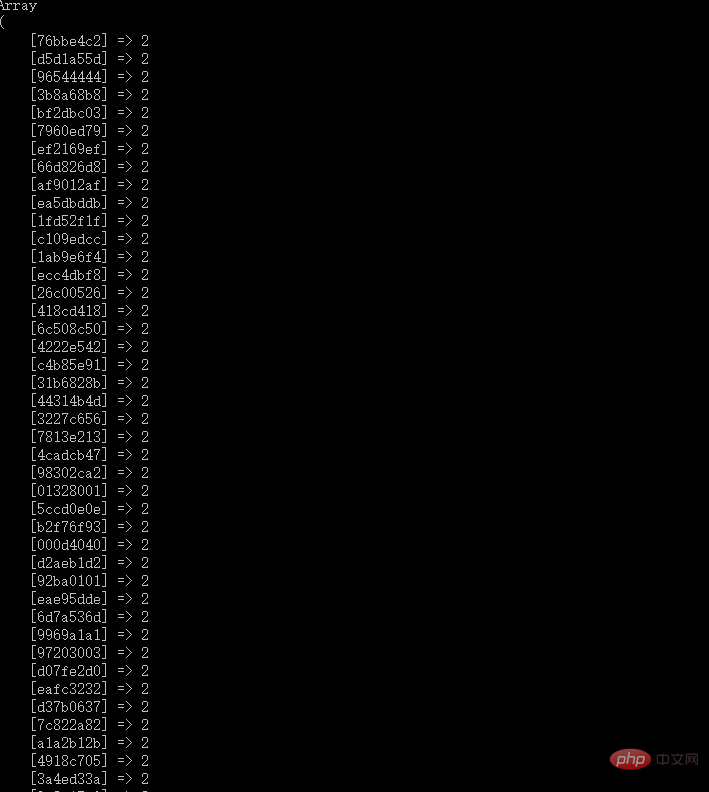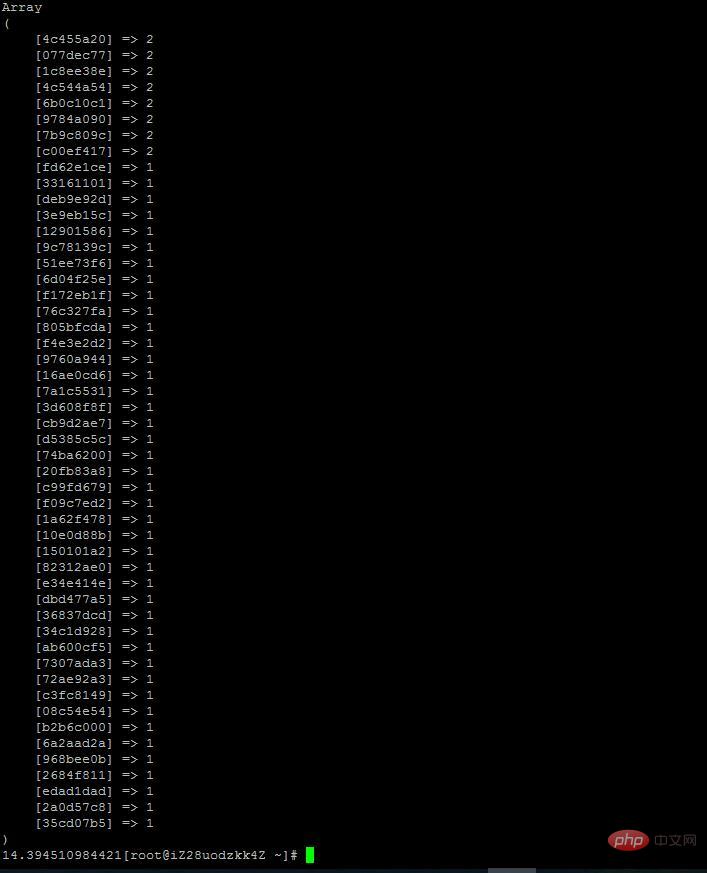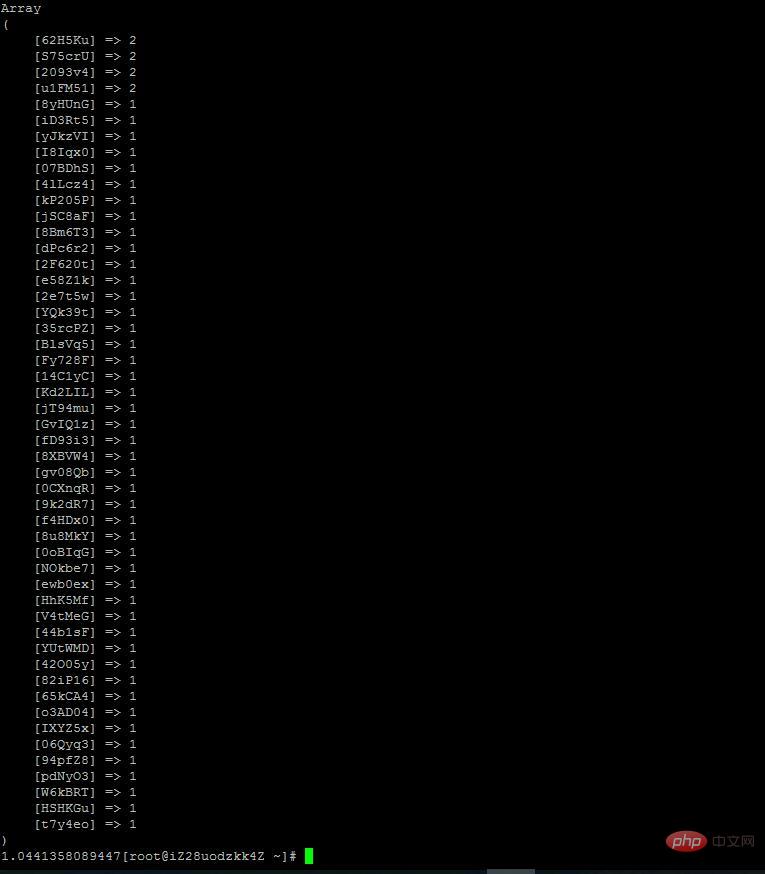PHP random number C extended random number
this article will introduce you to php random numbers and c extended random numbers. it has certain reference value. friends in need can refer to it. i hope it will be helpful to everyone.

because a fixed-length random string is used.
the first is a piece of php code
$str_md5=md5(uniqid()); $rand = mt_rand(1, 28); $str1=substr($str_md5,$rand,6); $rand = mt_rand(1, 28); $str2=substr($str_md5,$rand,6); $rand = mt_rand(1, 28); $str3=substr($str_md5,$rand,6); $code=substr($str1.$str2.$str3,0,8);

generate 180,000 random strings. the picture is arranged in reverse order according to the number of repetitions. you can see basically there are repetitions. but it's also ideal.
because i wanted to improve my c language skills, i rewrote the randomly generated string in c.
the random number functions srand() and rand() are used;
however, after an hour or two of hard work, there is still a problem with the random numbers. during concurrent access, the time may be almost at the same time, so the seed time given by srand can be regarded as the same. this results in the random numbers generated being the same. the resulting random string is the same. loop out random strings, almost all the same.
later i thought of ukey. this extension can implement a unique id. then every access will generate a unique id. can this id be used as the seed time? the answer is yes.

the above picture is a generated random string, the length can be customized. it is also possible to output strings with only numbers. compared with the random string generated by php, the repetition rate is lower and the speed is faster.
PHP_FUNCTION(get_random__num_str)
{
int length=8;
if (zend_parse_parameters(ZEND_NUM_ARGS() TSRMLS_CC, "l", &length) == FAILURE)
{
length=8;
}
length++;
int flag, i;
char* string;
__uint64_t timestamp = realtime();
__uint64_t retval;
int len;
char buf[128];
if (timestamp == 0ULL) {
RETURN_FALSE;
}
spin_lock(lock, pid);
if (context->last_timestamp == timestamp) {
context->sequence = (context->sequence + 1) & context->sequence_mask;
if (context->sequence == 0) {
timestamp = skip_next_millis();
}
} else {
context->sequence = 0; /* Back to zero */
}
context->last_timestamp = timestamp;
retval = ((timestamp - context->twepoch) << context->timestamp_left_shift)
| (context->datacenter_id << context->datacenter_id_shift)
| (worker_id << context->worker_id_shift)
| context->sequence;
spin_unlock(lock, pid);
//printf('%ld',retval);
srand((unsigned)retval);
//srand((unsigned) time(NULL ));
if ((string = (char*) emalloc(length)) == NULL )
{
//myLog("Malloc failed!flag:14\n");
RETURN_NULL() ;
}
for (i = 0; i < length - 1; i++)
{
flag = rand() % 3;
switch (flag)
{
case 0:
string[i] = '1' + rand() % 5;
break;
case 1:
string[i] = '2' + rand() % 7;
break;
case 2:
string[i] = '0' + rand() % 10;
break;
default:
string[i] = '9';
break;
}
}
string[length - 1] = '\0';
RETURN_STRINGL(string,length,0);
}
PHP_FUNCTION(get_random_str)
{
int length=8;
if (zend_parse_parameters(ZEND_NUM_ARGS() TSRMLS_CC, "l", &length) == FAILURE)
{
length=8;
}
length++;
int flag, i;
char* string;
__uint64_t timestamp = realtime();
__uint64_t retval;
int len;
char buf[128];
if (timestamp == 0ULL) {
RETURN_FALSE;
}
spin_lock(lock, pid);
if (context->last_timestamp == timestamp) {
context->sequence = (context->sequence + 1) & context->sequence_mask;
if (context->sequence == 0) {
timestamp = skip_next_millis();
}
} else {
context->sequence = 0; /* Back to zero */
}
context->last_timestamp = timestamp;
retval = ((timestamp - context->twepoch) << context->timestamp_left_shift)
| (context->datacenter_id << context->datacenter_id_shift)
| (worker_id << context->worker_id_shift)
| context->sequence;
spin_unlock(lock, pid);
//printf('%ld',retval);
srand((unsigned)retval);
//srand((unsigned) time(NULL ));
if ((string = (char*) emalloc(length)) == NULL )
{
//myLog("Malloc failed!flag:14\n");
RETURN_NULL() ;
}
for (i = 0; i < length - 1; i++)
{
flag = rand() % 3;
switch (flag)
{
case 0:
string[i] = 'A' + rand() % 26;
break;
case 1:
string[i] = 'a' + rand() % 26;
break;
case 2:
string[i] = '0' + rand() % 10;
break;
default:
string[i] = 'x';
break;
}
}
string[length - 1] = '\0';
RETURN_STRINGL(string,length,0);
}
the above picture is the time it takes for php to generate 18w random string

the above picture is the c extension to generate 18w the time it takes to generate a random string
the servers used are alibaba cloud servers with 1g memory and dual cores.
as long as you add the above code to ukey, you can produce random strings and random length digital strings
ukey’s address http://www.oschina.net/p/ukey
recommended learning: "php video tutorial》

Hot AI Tools

Undresser.AI Undress
AI-powered app for creating realistic nude photos

AI Clothes Remover
Online AI tool for removing clothes from photos.

Undress AI Tool
Undress images for free

Clothoff.io
AI clothes remover

Video Face Swap
Swap faces in any video effortlessly with our completely free AI face swap tool!

Hot Article

Hot Tools

Notepad++7.3.1
Easy-to-use and free code editor

SublimeText3 Chinese version
Chinese version, very easy to use

Zend Studio 13.0.1
Powerful PHP integrated development environment

Dreamweaver CS6
Visual web development tools

SublimeText3 Mac version
God-level code editing software (SublimeText3)

Hot Topics
 PHP 8.4 Installation and Upgrade guide for Ubuntu and Debian
Dec 24, 2024 pm 04:42 PM
PHP 8.4 Installation and Upgrade guide for Ubuntu and Debian
Dec 24, 2024 pm 04:42 PM
PHP 8.4 brings several new features, security improvements, and performance improvements with healthy amounts of feature deprecations and removals. This guide explains how to install PHP 8.4 or upgrade to PHP 8.4 on Ubuntu, Debian, or their derivati
 7 PHP Functions I Regret I Didn't Know Before
Nov 13, 2024 am 09:42 AM
7 PHP Functions I Regret I Didn't Know Before
Nov 13, 2024 am 09:42 AM
If you are an experienced PHP developer, you might have the feeling that you’ve been there and done that already.You have developed a significant number of applications, debugged millions of lines of code, and tweaked a bunch of scripts to achieve op
 How To Set Up Visual Studio Code (VS Code) for PHP Development
Dec 20, 2024 am 11:31 AM
How To Set Up Visual Studio Code (VS Code) for PHP Development
Dec 20, 2024 am 11:31 AM
Visual Studio Code, also known as VS Code, is a free source code editor — or integrated development environment (IDE) — available for all major operating systems. With a large collection of extensions for many programming languages, VS Code can be c
 Explain JSON Web Tokens (JWT) and their use case in PHP APIs.
Apr 05, 2025 am 12:04 AM
Explain JSON Web Tokens (JWT) and their use case in PHP APIs.
Apr 05, 2025 am 12:04 AM
JWT is an open standard based on JSON, used to securely transmit information between parties, mainly for identity authentication and information exchange. 1. JWT consists of three parts: Header, Payload and Signature. 2. The working principle of JWT includes three steps: generating JWT, verifying JWT and parsing Payload. 3. When using JWT for authentication in PHP, JWT can be generated and verified, and user role and permission information can be included in advanced usage. 4. Common errors include signature verification failure, token expiration, and payload oversized. Debugging skills include using debugging tools and logging. 5. Performance optimization and best practices include using appropriate signature algorithms, setting validity periods reasonably,
 PHP Program to Count Vowels in a String
Feb 07, 2025 pm 12:12 PM
PHP Program to Count Vowels in a String
Feb 07, 2025 pm 12:12 PM
A string is a sequence of characters, including letters, numbers, and symbols. This tutorial will learn how to calculate the number of vowels in a given string in PHP using different methods. The vowels in English are a, e, i, o, u, and they can be uppercase or lowercase. What is a vowel? Vowels are alphabetic characters that represent a specific pronunciation. There are five vowels in English, including uppercase and lowercase: a, e, i, o, u Example 1 Input: String = "Tutorialspoint" Output: 6 explain The vowels in the string "Tutorialspoint" are u, o, i, a, o, i. There are 6 yuan in total
 How do you parse and process HTML/XML in PHP?
Feb 07, 2025 am 11:57 AM
How do you parse and process HTML/XML in PHP?
Feb 07, 2025 am 11:57 AM
This tutorial demonstrates how to efficiently process XML documents using PHP. XML (eXtensible Markup Language) is a versatile text-based markup language designed for both human readability and machine parsing. It's commonly used for data storage an
 Explain late static binding in PHP (static::).
Apr 03, 2025 am 12:04 AM
Explain late static binding in PHP (static::).
Apr 03, 2025 am 12:04 AM
Static binding (static::) implements late static binding (LSB) in PHP, allowing calling classes to be referenced in static contexts rather than defining classes. 1) The parsing process is performed at runtime, 2) Look up the call class in the inheritance relationship, 3) It may bring performance overhead.
 What are PHP magic methods (__construct, __destruct, __call, __get, __set, etc.) and provide use cases?
Apr 03, 2025 am 12:03 AM
What are PHP magic methods (__construct, __destruct, __call, __get, __set, etc.) and provide use cases?
Apr 03, 2025 am 12:03 AM
What are the magic methods of PHP? PHP's magic methods include: 1.\_\_construct, used to initialize objects; 2.\_\_destruct, used to clean up resources; 3.\_\_call, handle non-existent method calls; 4.\_\_get, implement dynamic attribute access; 5.\_\_set, implement dynamic attribute settings. These methods are automatically called in certain situations, improving code flexibility and efficiency.






